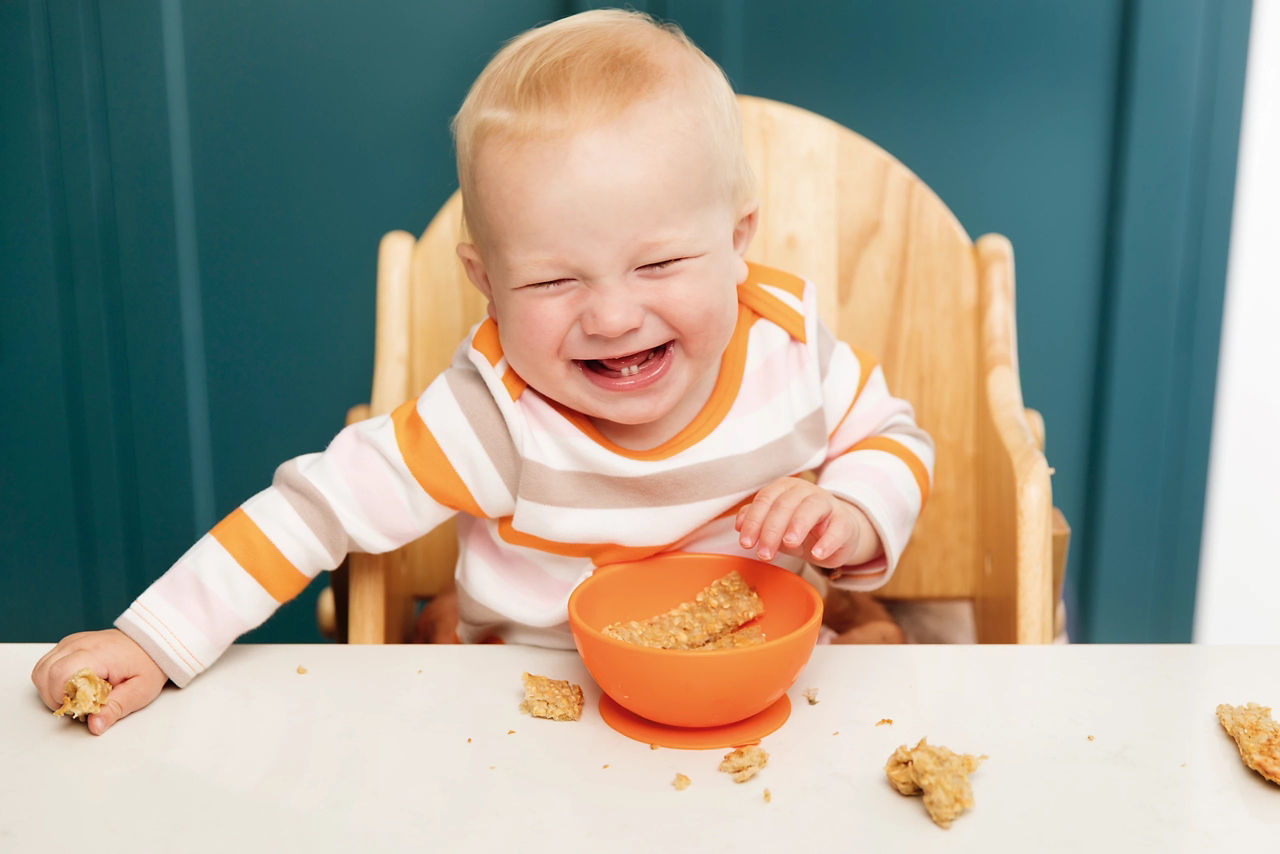Free weaning plan - Register here
Baby poo guide
Whether you’re new to poo or a nappy-changing pro, we’re here to help.
Let’s talk about baby poo
Baby poo. Once your baby arrives, you’ll soon forget that there was a time when your baby’s bowel movements didn’t take up so much headspace. As you become an expert in baby poo colour, smell and texture, you’ll be able to spot your little one’s ‘pooing face’ from a mile away and quickly spot the signs that something’s off (the poo can’t fool you).
So, without further ado, let’s talk about poo.
Baby poo - it’s got your baby’s back!
Ever heard parents talk about the infamous ‘poonami’?
They’re referring to that all-too-real moment when you realise poo has escaped your baby’s nappy and can now be found all the way up their back… lovely!
“I used to think this was something people were exaggerating. That’s until I found myself dealing with a seriously leaky nappy in the middle of lunch at a cafe. Twice. From that moment on, I never left home without at least three spare baby grows and a foldable changing mat!” (Sylvie’s mum)
Our expert midwife’s top tip for preventing poonamis? “Make sure your baby’s nappy is the right size and fits well around their bum and legs. This can be a case of trial and error when buying nappies, but it will help to prevent those messy leaks!”
Baby poo chart
| Baby poo colour and consistency | Frequency | Smell | |
|---|---|---|---|
| Newborn1 | A sticky black or green poo called meconium | Twice or more per day | No smell |
| Breastfed1,2 | Soft, yellow colour poos, sometimes with small seed-like bits in it | After each feed in the first few weeks Once per day or less after about 6 weeks | A weak, sometimes sweet smell |
| Bottle-fed1,2 | Firmer brown or green poos | Up to 5 times per day in the first few weeks Once per day after a few months | A stronger smell |
| Weaned babies2 | Firmer and darker brown | ||
Things to look out for2 Speak to your GP or health visitor if you spot any of these | Green poos along with a fussy baby Hard, small poos Very pale poos Very watery poos If you see blood in your baby’s poo, seek urgent medical advice as soon as possible. | No meconium in the first 48 hours Fewer than two poos in 24 hours up to 6 weeks | Very smelly poos – especially from breastfed babies |
| Medication2 | If breastfeeding, your diet or medications could lead to green poo |
Save or print the full baby and newborn poop chart (including pictures - you can thank us later) to come back to whenever you need it!
Knowing me, knowing poo: what to expect
From how often a newborn should poo to what happens when they start eating solid foods, we’ve got the answers to your baby poo questions.
Baby poo colour: yellow, green and in-between
Your baby’s first poo is called ‘meconium’. It’s a sticky, blackish-green poo that they’ll have in the first couple of days after birth1. Meconium looks different to other baby poo because it’s made up of things your baby’s ‘eaten’ in the womb (sometimes including lanugo, the fine hair that covered them earlier in pregnancy)3.
You should notice your little one’s poo change colour when they start to grow and feed. If you’re breastfeeding, you can expect your baby’s poos to become a pale yellow colour after a few days. Formula-fed babies tend to have darker and sometimes even green poos2. If you switch from exclusively breastfeeding to combi-feeding or to formula feeding, you might notice that your baby’s poo becomes darker and firmer4.
You can see examples of different baby poo colours for yourself in our baby poo colour chart.
The colour (and smell) of your baby’s poo will change again when they start to eat solid foods (seriously, buckle up), but that won’t be until they’re about 6 months old5.
Want top tips and guidance about introducing solid foods?
Let’s talk texture
Meconium, your baby’s first poo, tends to have a sticky, tar-like texture1. Be warned, meconium can be very stubborn to get off baby clothes – and your little one!
After a couple of days, the texture of your baby’s poo will change and be quite soft for breastfed babies, and a little firmer if you’re using formula or if you’ve switched to combi-feeding4. You might also notice what looks like little seeds in your baby’s poo – this is also completely normal2.
How often should a newborn poo?
There’s no hard and fast rule about this – every baby’s different. In general, your newborn will probably poo a lot in the early weeks and then less as they grow. Your little one might have a poo after every feed at first and then just once a day after the first few weeks1; “I couldn’t quite believe how many nappies my baby went through, even in those early days. Put nappies, lots of nappies, on your list of things to pack in your hospital bag. If you don’t use them on the maternity ward, you’ll certainly need them when you get home!” (Isla’s mum).
Your baby might sometimes go a few days without pooing, especially if they’re breastfeeding. But as long as their poos are still soft, this doesn’t mean they’re constipated1.
What’s that smell?!
You can’t avoid the facts… baby poo smells. But it doesn’t all smell the same.
Formula-fed baby’s poo tends to smell more strongly than breastfed baby’s poo. So, if you switch from breastfeeding to formula feeding, or your baby is ready to wean, prepare yourself for some potentially pungent nappy changes!2
Is my baby constipated?
Believe it or not, it’s common for some babies to strain or cry when they’re having a poo or go a few days without pooing at all (especially if you’re breastfeeding). But as long as the poo they do produce is nice and soft, it’s unlikely that they’re constipated1.
Your baby could be constipated if6:
- They have small, dry or hard poos
- Their wind and poo is smellier than normal
- They’re not as hungry
- Their tummy feels firmer than normal
Breastfed babies don’t get constipated very often. This is because breast milk is a natural laxative, and so breastfeeding babies may well poo a few times a day in the first six weeks of life7.
Constipation is a little more common for babies who are formula-fed or who are weaning, as their digestive system is getting used ti digesting and coping with new things2, 7.
If you think your baby’s constipated, you can try to get things moving again at home by6:
- Lying them down and gently moving their legs like they’re riding a bike
- Giving them a little tummy massage
If your little one still seems constipated after a few days, your GP or health visitor can give you some more advice.
What does baby diarrhoea look like?
Because baby poo tends to be pretty soft and paste-like before they start to eat solid foods, you might be worried that they have diarrhoea. But most of the time, that’s just what poos on an all-milk diet look like!
You’ll get to know what’s normal for your little one, and it’ll be fairly obvious if their baby poo changes.
Your baby might have diarrhoea if8:
- Their poos are a lot more watery than usual
- Their poos smell worse than is normal for them
- They’re pooing more often
As long as your baby doesn’t seem dehydrated, you can normally manage your baby’s diarrhoea at home – but check in with your GP or health visitor if you’re not sure8.
Keep your baby happy in their nappy: when to seek advice about your baby’s poo?
When you’re changing your baby’s nappy more times than you care to count, you get to know their pooing habits. If their poo changes without you changing their diet (e.g. switching from breastfeeding to bottle feeding or weaning), it’s always a good idea to talk to your GP or health visitor to make sure everything’s okay.
Some things to watch out for include2:
- Watery poos (could be a sign of diarrhoea)
- Hard, small poos (could be a sign of constipation)
- Pale poos
- Poos that are smellier than normal
- Poos that have blood in them
Top tip 💡
If you want to, you could always keep a diary of your baby’s feeding and toilet habits to make it easier to spot changes in their appetite or poos.
You might find this most useful when your little one starts to eat solid foods, to see if anything in particular upsets their tummy.
Download our baby poo colour chart to keep a handy guide of what to expect!
The bottom line
Baby poo is just one of those things you get used to dealing with when you’re busy being a parent. But whether it’s understanding your baby’s first poo, or guiding them through the potty training process, remember that you know your baby better than anyone. Just take things one day at a time and follow your baby’s lead.
If you’ve got any questions or want to talk about what to expect when it comes to all things baby poo, our team of baby experts is available to offer reassurance and advice. We’re here whenever you need us, so just give us a call.
Last reviewed: February 2025
Reviewed by Nutricia’s Medical and Scientific Affairs Team
Get ready with some serious baby nappy know-how.
NHS (2024). How to change your baby's nappy [online] Available at https://www.nhs.uk/conditions/baby/caring-for-a-newborn/how-to-change-your-babys-nappy/ [Accessed January 2025]
NCT (2024). Newborn baby poo in nappies [online] Available at https://www.nct.org.uk/information/baby-toddler/caring-for-your-baby-or-toddler/newborn-baby-poo-nappies [Accessed January 2025]
NHS 111 Wales (2023). Your baby at 37 weeks [online] Available at https://111.wales.nhs.uk/livewell/pregnancy/37to40weeks/ [Accessed January 2025]
NHS Cambridgeshire Community Services. Understanding your baby's poo [online 2023]. Available at https://www.cambspborochildrenshealth.nhs.uk/peeing-pooing-and-toileting/understanding-your-babys-poo/. [Accessed February 2025]
NHS Start for Life. How to start weaning your baby [online] Available at https://www.nhs.uk/start-for-life/baby/weaning/how-to-start-weaning-your-baby/ [Accessed January 2025]
NHS Start for Life. Constipation and bottle feeding [online] Available at https://www.nhs.uk/start-for-life/baby/feeding-your-baby/bottle-feeding/bottle-feeding-challenges/constipation-and-bottle-feeding/ [Accessed January 2025]
NHS Start for Life. Constipation and breastfeeding [online]. Available at https://www.nhs.uk/start-for-life/baby/feeding-your-baby/breastfeeding/breastfeeding-challenges/constipation/. [Accessed February 2025]
NHS West Suffolk (2022) Gastroenteritis - management of babies and children [online] Available at https://www.wsh.nhs.uk/CMS-Documents/Patient-leaflets/PaediatricDepartment/6223-1-Gastroenteritis-management-of-babies-and-children.pdf [Accessed January 2025]
Baby topics
Need free advice with a smile? Get in touch with our dedicated Care team.
Ask us a question (8am - 8pm Monday to Friday, 10am - 4pm Weekends)
Messenger
Contact us on Facebook (10am - 10pm, 7 days a week)
Call us
Call us on 0800 977 8880 (8am - 8pm Monday to Friday)
FAQs
Get answers to your most frequently asked questions




